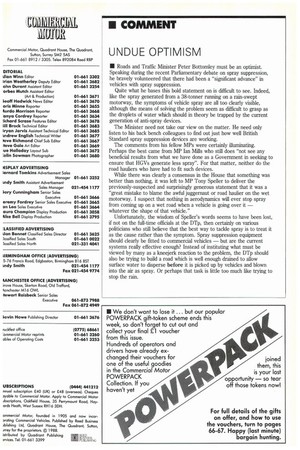UNDUE OPTIMISM
Page 5

If you've noticed an error in this article please click here to report it so we can fix it.
• Roads and Traffic Minister Peter Bottomley must be an optimist. Speaking during the recent Parliamentary debate on spray suppression, he bravely volunteered that there had been a "significant advance" in vehicles with spray suppression.
Quite what he bases this bold statement on is difficult to see. Indeed, like the spray generated from a 38-tanner running on a rain-swept motorway, the symptoms of vehicle spray are all too clearly visible, although the means of solving the problem seem as difficult to grasp as the droplets of water which should in theory be trapped by the current generation of anti-spray devices.
The Minister need not take our view on the matter. He need only listen to his back bench colleagues to find out just how well British Standard spray suppression devices are working.
The comments from his fellow MPs were certainly illuminating. Perhaps the best came from MP Ian Mills who still does "not see any beneficial results from what we have done as a Government in seeking to ensure that HGVs generate less spray". For that matter, neither do the road hauliers who have had to fit such devices.
While there was clearly a consensus in the House that something was better than nothing, it was left to MP Tony Speller to deliver the previously-suspected and surprisingly generous statement that it was a "great mistake to blame the awful juggernaut or road haulier on the wet motorway. I suspect that nothing in aerodynamics will ever stop spray from coming up on a wet road when a vehicle is going over it — whatever the shape of that vehicle."
Unfortunately, the wisdom of Speller's words seems to have been lost, if not on the full-time officials at the DTp, then certainly on various politicians who still believe that the best way to tackle spray is to treat it as the cause rather than the symptom. Spray suppression equipment should clearly be fitted to commercial vehicles — but are the current systems really effective enough? Instead of instituting what must be viewed by many as a kneejerk reaction to the problem, the DTp should also be trying to build a road which is well enough drained to allow surface water to disperse before it is picked up by vehicles and blown into the air as spray. Or perhaps that task is little too much like trying to stop the rain.
























































































































































